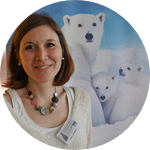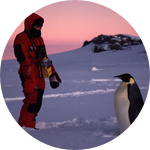About This Project
In April 2017, an all-female team of 11 European and Middle Eastern explorers will ski the last degree to the North Pole. In this bold endeavor, the team hopes to open a dialogue and bridge the gap between East and West. This expedition presents an exceptional opportunity to study how women respond to the extreme pressures that the Arctic imposes on their bodies by tracking their biological rhythms, energy needs and physiological stress. An all-female scientific team will conduct this study.
Ask the Scientists
Join The DiscussionWhat is the context of this research?
Throughout the ages, humans have been characterized by their thirst for exploration. Mankind has ventured from deep sea to the highest mountains, the poles and even space. With each of these habitats come specific climatic and physical obstacles for explorers to overcome. The polar regions offer a unique set of hazards including extreme temperatures, blizzards, difficult terrain due to moving ice, and long daylight. The geography and remoteness of the Arctic restricts deep access to walking or cross-country skiing. These modes of locomotion impose very high energy expenditure, which coupled with these extreme conditions can jeopardize health. However, to which extent the human body is impacted is however poorly known.
What is the significance of this project?
Only a few studies have investigated the physiological adaptations during Polar expeditions. Most of these studies were conducted more than 20 years ago and in men only. This research project will be the first one studying an all-female expedition to examine the metabolic and physiological adaptations to extreme conditions in women. This project represents therefore a unique opportunity to better understand the capacity of our organism to adapt when facing extreme environmental conditions. It will further help planning future exploratory missions to extreme environments, such as Polar Regions or space.
What are the goals of the project?
The objective of this project is to understand the adaptations of the body to extreme conditions in women. Using state-of-the-arts methods our goals are to determine the impact of polar conditions on:
- the energy needs of the explorers to cross the Arctic and reach the last degree of the North Pole,
- their biological rhythms by following the pattern of physical activity, sleep, heart rate and body temperature,
- their physiological and mental stress response.
The explorers will meet with the scientific team before and immediately after the expedition to record their health status, body weight, body fat and muscle mass. They will also wear at all time data loggers to track their biological rhythm in real-time and fill up questionnaires.
Budget
These 11 activity monitors and data logger are key to the project as they will help us achieving the primary objective of this research project: tracking the biological rhythms of the body by following the pattern of physical activity (ActiGraph), sleep (ActiGraph), heart rate (Heart Rate Monitor) and body temperature (iButton) of the 11 female explorers.
Additional funding has been requested from the National Geographic. Our research institute has also kindly accepted to dedicate some fund to help us completing the study.
Endorsed by
Meet the Team
Affiliates
Team Bio
The team is composed of four female researchers who have extensive research experience and complementary skills . The project leader, Audrey, will bring her expertise in human physiology research. Chantal Simon, MD will serve as the study physician. Caroline Gilbert has extensive experience with field work in Polar regions and animals. Sophie Bourgeon will be our local collaborator and will help with the logistical aspects of the project in Norway.
Audrey Bergouignan
I am fascinated by how living beings, including plants, animals and humans, adapt to changes of their environment. Over the years I specialized as a human physiologist studying metabolism and its regulation by environmental factors (diet and physical activity). I am employing a unique translational approach by aiming to understand the capacity of the body to adapt to extreme conditions such as space environment or polar conditions, to then help understanding the onset and progression of metabolic diseases such as obesity and type 2 diabetes. My ultimate goal is to develop novel strategies of prevention and treatment of these metabolic diseases that represent a public health burden, and thus improve human condition.
I am furthermore passionate by the outdoors adventures (skiing, cross-country skiing and back-country hiking) and traveling. This project is for me an amazing opportunity to assemble all my passions at once by leading a top level research project along with other enthusiastic and skilled female researchers, meeting with an International team of female explorers and trying to improve our knowledge on human body. I hope it will further inspire all young female scientists and explorers to go beyond what is expected from them and reach their dreams.
Chantal Simon
http://carmen.univ-lyon1.fr/eq...
I am a Professor of Medicine at the University of Lyon in France. After many years of practice, I have decided to drive my career towards the fascinating field of research hoping to have a greater impact on human health. I wanted to be able to better understand the causes favoring the development of chronic diseases. I completed a PhD in epidemiology on obesity. I am now one of the leaders of a research team at the CarMeN institute that gathers scientists and clinicians to work on the determinants of sedentary behaviour and obesity, and on the role of the regulation of muscle mass and metabolism in obesity complications, such as insulin resistance.
I was Audrey's PhD supervisor and am very excited she asked me to team up for this exceptional project. I will ensure the health of both the explorers and study team during the study. I will also bring my experience as a senior researcher to ensure the success of the project.
Sophie Bourgeon
My research focuses on ecological physiology, endocrinology and ecotoxicology of free-living avian and mammal Arctic species. I am namely investigating the unique metabolism of polar bears from the Barents sea area in the context of a warming climate.
I live in beautiful Norway above the polar circle where I can enjoy Northern lights and country skiing.
I am especially thrilled at the idea of joining the research team and to be part of this unique human experience.
Gilbert Caroline
I am studying physiological and behavioural adaptations of organisms to their environmental constraints, both on an individual and a populational point of view. In particular, my research focus on 1) energy saving strategies of endotherms through huddling and 2) coping styles of individuals through personality traits, stress reaction and metabolism.
My main animal models are: emperor penguins, newborn rabbits, microcebes, elephant seals, dogs.
I am so enthusiastic to join the team and the project to study women's adaptations to such an extreme environment! This is such a great adventure.
Lab Notes
Nothing posted yet.
Additional Information
The details of the expedition can be found here:
http://www.euroarabianexpedition.com/
https://www.facebook.com/euroa...
Project Backers
- 27Backers
- 33%Funded
- $1,815Total Donations
- $64.82Average Donation




